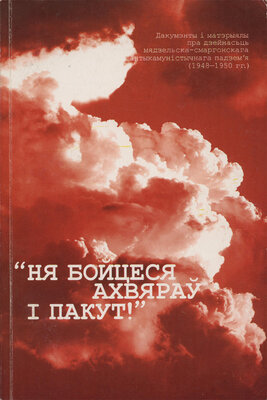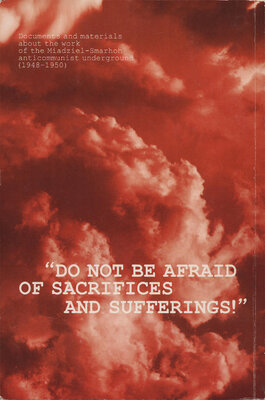Ня бойцеся ахвяраў і пакут!
Міхась Чарняўскі
Выдавец: Наша Будучыня
Памер: 175с.
Вільня 2006
Achramovic (Maksimovic) Hanna (1890, v. Achremahcy, Braslau region 1977, Elblong, Poland)
The mother of Zianon Achramovic. In autumn 1949 at khutor near Carniaty assisted Smarhon underground members in anticommunist leaflets printing cooked for them and fed them. Was arrested at the end of March 1950 and was sentenced the same summer to the 25 years’ imprisonment. Served the sentence in Babrujsk, then in camps of the Habarovsk region. Was released in 1955, returned to Carniaty. Later moved to Poland with husband and Zianon.
Achramovic Zianon (13.12.1930, v. Carniaty, Smarhon region; lives in Elblong, Poland).
Born in the family of Aiihuscin and Hanna Achramovic, the members of the underground movement in the Smarhon region. In autumn 1949 in Smarhon in the house of the Cybouskis got acquainted with Rascislati Lapicki and other members of the underground organization. At their suggestion helped to print anticommunist leaflets at the father’s khutor, distributed them in the nearby villages and at the ferry passage across the Viailia. Was arrested on February 2, 1950 and was sentenced the same summer in Maladziecna to the 25
134
years’ imprisonment. Served the sentence mainly in Sverdlovsk region at logging and construction sites. Was released in 1956. Returned to the Smarhon region and shortly after together with parents left for Poland.
Asukouskaja (Halumian) Caslava (08.12.1932, Sarkauscyna, Viciebsk region; lives in Tuapse, Russia)
While studying at the Smarhon secondary school got acquainted with pupilsanticommunists, knew about the existence of the organization, was friendly to and approved of the underground members, however didn’t manage to join the active work. Was arrested together with Maryja Bartasevic on March 23,1950. On the 8th of May was sentenced to 8 years of imprisonment “for noninformation”. Being underage the first year was kept in children’s colony, the subsequent term served in concentration camps near Sverdlovsk, where she did various hard work. In summer 1954 was released and returned to Smarhon. Got married here. Now after the husband’s death lives in Russia.
Bartasevic (Abumava) Maryja (1926, v. Kuncauscyna, Smarhon region ? Komi, Russia, the burial place is unknown)
Born near Kreva in a small village of Kuncauscyna. In autumn 1949 studying in the 10th form of the Smarhon secondary school learned from friends about the anticommunist activities of the pupils’ underground organization. Was arrested on the 23rd of March 1950. At the interrogations denied everything. Sentenced together with C. Asukouskaja on the 8th of May the same year to the 10 years’ imprisonment “for noninformation”. Served the sentence, according to neighbors, in Komi. After having been released stayed there and got married. Died more than 10 years ago.
Blizniuk Vosip (12.12.1930, v. Samatova, Smarhon region 01.08.1994, buried in Samatova)
Born in the rural family with many children. Studied at the Smarhon secondary school. Was arrested in February 1950 for participation in the anticommunist underground organization of the Smarhon pupils (preparation for the subversive activity destruction of the printing
135
house), was sentenced the same summer to the 25 years’ imprisonment in concentration camps. Was released in 1955, returned to the fatherland to the native village.
Ivanoiiski Kanstancin (03.01.1930, v. Dehisi, Smarhon region; lives in v. Dehisi)
Finished the Soly sevenyear school, then went to study at the Smarhon secondary school. Knew about the existence of the Smarhon pupils’ organization, however actually didn’t participate in its activities. Was arrested while being the pupil of the 9th form in February 1950. Did not admit anything during interrogations. Was sentenced to the 10 years’ imprisonment. Served the sentence in the Sverdlovsk region at logging and construction sites. Was released in February 1954. Returned to the native village, works in agriculture.
Karniej Anatol (07.08.1928, v. Mickavicy, Smarhon region 15.07.2004, buried in v. Mickavicy)
Studied at the Smarhon secondary school. In February 1950, being the pupil of the 9th form, was arrested and in the same July was sentenced on the case of the MiadzielSmarhon underground (distribution of leaflets) to the 25 years’ imprisonment in concentration camps. In mid 1950s got out of prison with his health undermined. Returned to the fatherland. Worked in kolkhoz mostly as a blacksmith.
Kacerha Juzaf (27.09.1930, v. Kacarhi, Miadziel region; lives in Szczecin, Poland)
Born in the manychildren family of the ploughman and fisher honored by the fellowvillagers. Studied at the Miadziel secondary school, where got acquainted with Rascislau Lapicki and other members of the pupils’ underground organization. From spring 1948 participated in secret meetings, printed and distributed anticommunist leaflets, rehid weapons and explosives, was in contact with the organization’s leader Lapicki after the latter had moved to Smarhon. On the 10th of February of 1950 he was arrested during the lesson at school. Was kept in prisons of Vialiejka and Maladziecna. On the 20th of May 1950 was sentenced together with other participants of the
136
MiadzielSmarhon anticommunist movement by the Military tribunal of the Belarusian military district to the 25 years’ imprisonment in concentration camps. Served the sentence mostly in Kurlag near TemirTau (Kazakhstan) in a quarry and then at construction sites.
After the trial on Juzaf his family was repressed: the sister was fired, the father was sent to prison for 5 years.
In summer 1956 J. Kacerha returned to the Miadziel region and in the same autumn together with parents and sister moved to Poland.
Lapicki Rascislau (01.09.1928, v. Kasuta, Vialiejka region 27.10.1950, the burial place is unknown)
Born in the manychildren family of the Orthodox priest Aliaksandar Lapicki. The children of the Lapicki were familiar with the patriotic literature printed in the western part of Belarus, kept ties with Belarusian gymnasia in Vilnia. During the World War II the father with the wife and the youngest son Rascislau (the older sons and the daughter already lived on their own) moved to the Miadziel region, where he got a parish in Kabylnik. After the Germans were turned out from Belarus in the beginning of autumn 1944 Rascislah went to study to the newly opened Kabylnik sevenyear school. At the same time he joined the underground patriotic organization of the Belarusian youth of Vilnia and Vilnia region with the help of the elder brother Alieh Lapicki, the student of the Vilnia theological seminary. After the organization was revealed and many of its members arrested, 16yearold Rascislau was sentenced as well to the 3years’ imprisonment as the underage. However according to the amnesty dedicated to the victory over the fascist Germany in 1945 he was released from prison and returned to Kabylnik, where continued his school education. After his father’s death in 1946 the abandoned family the mother and the son in winter 1947 moved to Mikasiecak near Miadziel, where Rascislau tried to find a job at the local church. He went from Mikasiecak to the 8th and 9th form of the Miadziel tenyear school.
Rascislau was a unique person, showered with numerous talents, with generous and kind soul open to the pain of others. He was good at painting, singing and played many different musical instruments. He had abilities for constructing and inventing made receivers, designed “electric machine” to cure the patients, wooden bicycle, could make
137
explosive device. While in Kabylnik and especially in the Miadziel school, Rascislau Lapicki was notable for his anticommunist and patriotic sentiments. He didn’t hide his thoughts and beliefs, defended them with the ardor of the youth even at lessons.
Among the Miadziel pupils Rascislau found likeminded people, who did not accept the communist regime that was established in Belarus. First of all those were Fakunda Niesciarovic from Juskavicy and Juzik Kacerha from Kacarhi. They often met in Miadziel where the pupils lived or in Mikasiecak in the Lapicki’s apartment or in the house of a local villager. At the beginning of 1948 the underground organization was founded on the initiative of Rascislau, which was mainly engaged in printing and distributing of the anticommunist leaflets.
In autumn 1949 Rascislad with mother moved to Smarhon to his relatives. In Smarhon Rascislau went to the 10th form of the local school. And here he immediately started looking for friends those, who were not indifferent to the destiny of the fatherland. The agitation started during the school recessions, parties at the club, where Rascislau earned by playing the piano. About a dozen of likeminded people gathered.
The Smarhon members of the underground launched wide anticommunist leaflet campaign. However at the beginning of December Rascislau Lapicki was arrested and then released temporarily. The council of the underground organization declared that Lapicki had to leave Smarhon. And he secretly returned to the Miadziel region again. Some time he spent in Mikasiecak, Juskavicy, Kacarhi. Then with a severe cold he moved to the acquaintances in Kabylnik. Here his brotherinarms from Smarhon Caslati Cybouski found him and delivered him the proposal of the partisans of the Home Army to carry him over the border. However the severely ill Rascislaft didn’t manage to take that opportunity. He was arrested again in Kabylnik. Before the trial he was kept in the prisons of Vialiejka and Maladziecna, where at the interrogations he was violently tortured.
The trial on Rascisl ай Lapicki and the majority of the participants of the MiadzielSmarhon underground was held in Maladziecna in July 1950. The organization’s leader behaved courageously and undefeatedly, admitted all the guilt. He declared to communists that they
138
forced people to enter kolhozes, overtaxed them, severely punished them for any protest, closed churches. The accused did not justified himself but blamed the communist regime. The Military Tribunal of the Belarusian military district sentenced Rascislad Lapicki to be shot. The patriot accepted that verdict courageously and refused categorically to appeal for pardon.
 КНІГІ ОНЛАЙН
КНІГІ ОНЛАЙН


